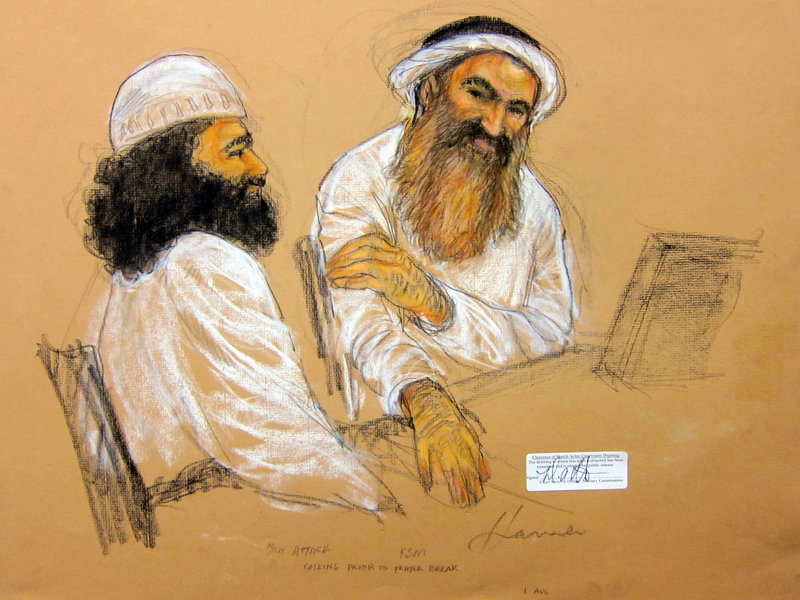GUANTANAMO BAY NAVAL BASE, Cuba — The five men accused of plotting the Sept. 11, 2001, attacks used their weekend war court appearances to stage “peaceful resistance to an unjust system” being used for political reasons, defense lawyers said Sunday – a day after the defendants turned the judge’s plans to hold a simple arraignment into a 13-hour marathon of prayer and protest.
“The system is a rigged game to prevent us from doing our jobs,” said defense attorney David Nevin, accusing the prison-camp commander of making it impossible to learn from alleged mastermind Khalid Sheik Mohammed how the CIA waterboarded him 183 times and used other since-outlawed techniques to break him.
Mohammed, his nephew and three other men allegedly trained, advised and financed the 19 hijackers who crashed airliners into the World Trade Center, Pentagon and a Pennsylvania field, killing 2,976 people. All could get the death penalty if convicted.
“The government wants to kill Mr. Mohammed to extinguish the last eyewitness to his torture,” Nevin said.
He and other attorneys met with reporters Sunday to discuss the proceedings, which lasted until 10:30 p.m. Saturday.
“We’re here for a political reason,” said Nevin, who also referred to Attorney General Eric Holder’s plan to take the case to New York until Congress overruled him.
But the Pentagon’s chief prosecutor, Army Brig. Gen. Mark Martins, defended the military tribunal process and said that it treats both sides fairly.
“The arraignment was only the start of a legal process that could take many months,” he said, deflecting a question on whether the Pentagon was preparing an execution site at this remote outpost.
“The United States is committed to gaining accountability for those who attacked and killed innocent people.”
He said defense lawyers can talk to their clients but can’t show them classified documents that disclose harsh treatment. Otherwise, he said, “they can talk to their clients about anything.”
Even if there were some form of torture, it should not “pollute” the entire case, he said.
“The remedy is not to just dismiss all the charges,” Martins said. “It does not mean that everybody goes free, that everybody is free of accountability just because somebody else did something wrong.
“That’s not justice,” he said. “We have to submit that to our courts methodically.”
During Saturday’s hearing, however, the accused and their attorneys did their best to frustrate the methodology that the judge had scripted.
Each of the accused refused to answer basic questions posed to them by Army Col. James L. Pohl, the war court’s chief judge, on whether they accepted their Pentagon-appointed attorneys. Instead, they periodically disrupted the proceedings with demonstrations of Muslim prayer and protests of prison conditions.
Ramzi Binalshibh, 40, a Yemeni who allegedly organized a cell of 9/11 hijackers in Germany, likened the Guantanamo detention center to that of the brutal regime of Moammar Gadhafi in Libya.
Fellow Yemeni Walid bin Attash, 33, who allegedly trained some hijackers in hand-to-hand combat, took off his shirt to try to display scars his lawyer said resulted from abuse by the guards at Guantanamo. The judge ordered him to put it back on.
“These men have endured years of inhumane treatment and torture” that will “infect every aspect of this military commission tribunal,” attorney James Connell said Sunday. On Saturday, he said, “The accused participated in peaceful resistance to an unjust system.”
Connell’s client, Pakistani Ali Abd al-Aziz Ali, affected a lack of interest Saturday, perusing a magazine. During a recess, he handed it to Saudi co-defendant Mustafa al-Hawsawi, 43, who, like Ali, is accused of wiring money to the hijackers.
Criticism didn’t come from only the defense attorneys.
Retired Rear Adm. Donald Guter, the Navy’s top lawyer on Sept. 11, 2001, said Sunday, “I am convinced more than ever that this belongs in federal court.” He came to Guantanamo to watch the proceedings for Human Rights First, as a critic of commissions.
It wasn’t just the 13-hour proceeding that ended with a reading of the charges that discomfited critics but also the tug-of-war over fundamental issues – from prison camp conditions to restrictions on communications between the accused and their defenders.
Al-Hawsawi’s attorney, Navy Cmdr. Walter Ruiz, struggled throughout the arraignment to get the judge to hear arguments on why the defense is hobbled by limited resources, and why the case should be dismissed as improper.
Pohl said he’d address those issues at the next hearing June 12-15. He approved the legal teams, then took questions from the defense teams about his background and potential conflicts at trials.
Pohl sought to waive the reading of the charge sheet, but bin Attash asked for them to be read, a single defendant’s prerogative, extending the arraignment into the night.
“The participants were raced up to the coliseum for the pleasure of the masters,” Ruiz said Sunday.
– The Tribune Washington Bureau contributed to this report.
Send questions/comments to the editors.



Success. Please wait for the page to reload. If the page does not reload within 5 seconds, please refresh the page.
Enter your email and password to access comments.
Hi, to comment on stories you must . This profile is in addition to your subscription and website login.
Already have a commenting profile? .
Invalid username/password.
Please check your email to confirm and complete your registration.
Only subscribers are eligible to post comments. Please subscribe or login first for digital access. Here’s why.
Use the form below to reset your password. When you've submitted your account email, we will send an email with a reset code.